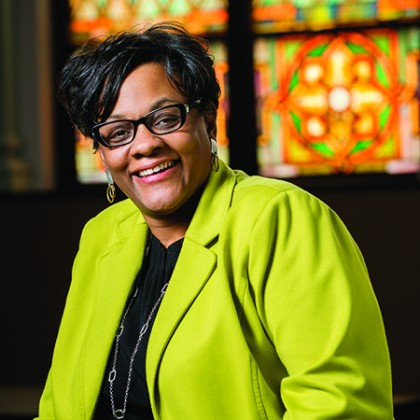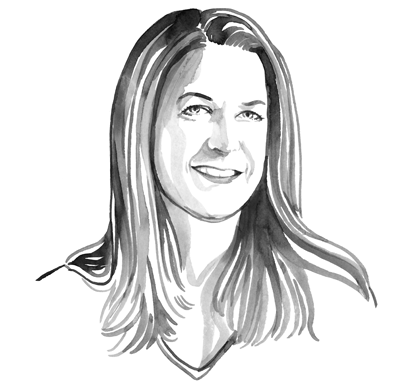Trivia: Dreams about living on Venice Beach and designing jewelry
Non-trivial pursuits: Plays the violin and the flute
Addicted to: Detective TV shows and mystery novels
You are a scholar in the field of education, so I can't resist asking what you think of MOOCs, massive open online courses.

Image caption: Cheryl Holcomb-McCoy is vice dean of academic affairs and a professor at the School of Education. One of her major research areas is the measurement of multicultural self-efficacy and cultural competence in school counseling.
Image credit: Marshall Clarke
We'd be fooling ourselves if we thought that students weren't doing a great deal of learning online. The question is: What are the best practices for online learning? It turns out that we haven't evaluated the outcomes of MOOCs with different populations of students and adult learners. How do we know what works? Of course, we don't really have data about whether large lecture hall courses work either. There is so much to learn in this area.
Are you researching online education?
We're not simply looking at the use of technology but investigating questions such as: How do you best build a learning community? How do you best communicate with students online? Regardless of learning format, we are finding that students still want contact with their instructor. We have data on students who succeed in learning online. We need more research on students who don't learn online and why.
What do you think is the best way to assess learning?
Performance. What behavioral changes are evident after instruction? Certainly if I say that my students are learning, I should be able to go to an assessment that demonstrates students' learning of knowledge, behavior, or skill. Given that we are a professional school, a major component of our mission is to prepare skilled educators and education researchers.
I spend a great deal of time in the classroom and would like to know what I might do better.
That's precisely my job! In my role as vice dean of academic affairs, I try to connect our education faculty with faculty from other divisions across the university. My goal is to help others see the connections between education (for example, teaching and learning) and just about every other subject. How do we translate research and science in various fields—cognitive science, biology—into what goes on in the classroom? This is why we in the School of Education are involved in joint faculty appointments with the School of Public Health and the School of Arts and Sciences. We're hoping that these new joint faculty appointments will connect education to other areas across the university.
Much of your research is on the importance of counseling in schools. Is it possible to teach or provide counseling online?
We're working on that question, too. Counseling via Skype may be just as effective as in-person counseling, but there is just not an exhaustive amount of research on alternatives to one-on-one counseling in any setting. We're looking into some online-hybrid programs to teach and supervise therapeutic and counseling skills.
Your first degree is in early childhood education. When was it clear to you that your interests were more in the area of counseling and social justice?
I knew that I wanted to go into counseling after my first year as a kindergarten teacher in Montgomery County Public Schools. I decided to enroll in the graduate counseling program at the University of Virginia because I was intrigued by the work of school counselors, particularly in low-income, diverse school communities. It was also during this period as a kindergarten teacher that I realized the inequities in education, particularly the differences in student access to opportunities, lack of effective communication with parents of diverse backgrounds, lack of teacher cultural competence and responsiveness, and so on.
Did you always want to teach? Did you receive good counseling?
I wanted to be a journalist initially. I love to write and create stories. Discovering and investigating new ideas have always interested me. I became interested in teaching after working at my dad's school with struggling second-grade readers one summer while in college at UVA. I've never been the recipient of counseling, except during my training program.
Did your mother talk you out of a life hanging out on Venice Beach?
Yes. Absolutely. But my husband and I are looking forward to a life on the beach in retirement.
Cheryl Holcomb-McCoy is vice dean of academic affairs and a professor at the School of Education. One of her major research areas is the measurement of multicultural self-efficacy and cultural competence in school counseling.

Hollis Robbins, A&S '83, is chair of the Humanities Department at the Peabody Institute; she teaches courses in literature, drama, film, and aesthetics. She has a joint appointment in the Center for Africana Studies at Homewood, where she teaches African-American poetry and civil rights.
Posted in Voices+Opinion
Tagged moocs, online learning







